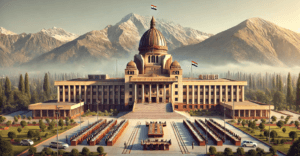J&K Assembly Blocks Debate on Article 370 and Reservation – Here’s Why!
The Jammu & Kashmir Legislative Assembly has rejected resolutions related to Article 370 and Reservation Policy, citing procedural rules. As per Rule 187, a resolution cannot be reintroduced within a year of a similar one being discussed. PC leader Sajad Gani Lone had submitted a resolution seeking the restoration of Article 370 and 35A, but it was disallowed. Additionally, resolutions on reservation-related matters from both ruling and opposition legislators were rejected because the issues are currently under review in the J&K High Court.
According to Rule 177(5), discussions on court-related matters are prohibited. However, this rule does not apply to bills, meaning legislation on reservation can still be introduced. A ballot procedure will decide which resolutions will be discussed, with the selection process scheduled for March 25. Seven resolutions will be debated in the Assembly on April 7 and 9, sparking political reactions from different parties.

J&K Assembly Blocks Debate on Article 370 and Reservation – Here’s Why!
The Jammu and Kashmir (J&K) Legislative Assembly recently dismissed multiple proposals seeking to revisit two sensitive topics: the restoration of Article 370 and changes to the region’s reservation policies. These decisions were guided by the Assembly’s procedural rules, which restrict debates on issues already under judicial review or previously discussed.
Why Article 370 Resolutions Were Rejected
Article 370, which granted J&K special autonomy, and Article 35A, which allowed the region to define its permanent residents, were revoked by the Indian government in August 2019. Since then, some political groups have sought to reverse this decision. Recently, Sajad Gani Lone, a leader of the People’s Conference (PC) party, submitted a resolution urging the reinstatement of these provisions. However, the Assembly Secretariat blocked the proposal, citing Rule 187 of its procedural guidelines, which prohibits reintroducing a resolution on the same topic within one year of a prior discussion. While the Assembly did not specify when Article 370 was last debated, the rule effectively halted the current proposal.
Reservation Policies Face Similar Hurdles
Resolutions concerning J&K’s reservation policies, which aim to provide quotas in jobs and education for marginalized communities, were also rejected. Both ruling party and opposition legislators had submitted proposals on this issue. However, the Assembly noted that reservation policies are currently under scrutiny in the J&K High Court. Under Rule 177(5), the Assembly cannot debate topics under judicial review to prevent influencing court proceedings or creating conflicting decisions.
Importantly, this restriction applies only to resolutions—not bills. This means lawmakers can still propose new laws related to reservation policies, but they cannot hold discussions or pass non-binding resolutions while the court case is ongoing.
How Resolutions Are Chosen for Debate
With these rejections, the Assembly will now use a lottery system to determine which resolutions will be prioritized for discussion on April 7 and 9. On March 25, a ballot process will randomly select seven resolutions for each session. This method ensures fairness and transparency in setting the agenda, preventing bias toward specific topics or parties.
Broader Implications
The rejection of these resolutions highlights the Assembly’s adherence to procedural norms, especially on contentious issues. Article 370 remains a polarizing topic, with some viewing its revocation as a step toward national integration and others seeing it as a loss of J&K’s identity. By invoking Rule 187, the Assembly avoids reopening a deeply divisive debate prematurely.
Similarly, the reservation policy debate touches on social justice and equality. While the Assembly’s decision to defer discussion respects judicial boundaries, it also delays potential legislative adjustments to address evolving societal needs.
Political Reactions
Sajad Lone’s blocked resolution reflects ongoing tensions between regional parties and the central government. The People’s Conference, which advocates for J&K’s autonomy, has criticized the revocation of Article 370 as undermining the region’s unique status. The rejection of their resolution may intensify calls for greater political representation and dialogue.
Meanwhile, the handling of reservation policies underscores the challenge of balancing judicial and legislative processes. Lawmakers pushing for changes to quotas argue that delays affect marginalized groups, while the Assembly’s decision emphasizes respect for the court’s authority.
Looking Ahead
The upcoming ballot-selected resolutions will shape the Assembly’s agenda in early April. Topics could range from infrastructure development to public welfare schemes, avoiding legally restricted issues. For now, the rejection of Article 370 and reservation proposals signals a cautious approach by the Assembly, prioritizing procedural compliance over immediate political or social debates.
In summary, the J&K Legislative Assembly’s recent decisions underscore the complex interplay between legal guidelines, judicial oversight, and political demands. While procedural rules maintain order, they also postpone critical discussions on issues central to the region’s identity and equity. The ballot process will determine the next steps, but the broader debates surrounding autonomy and reservation policies remain far from settled.
You must be logged in to post a comment.